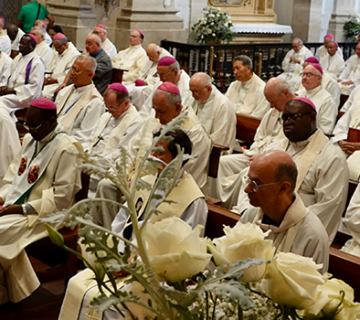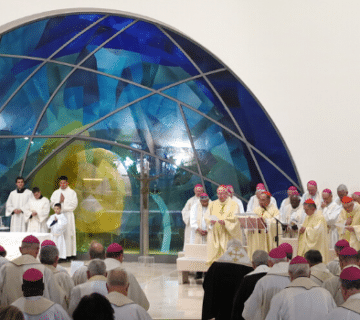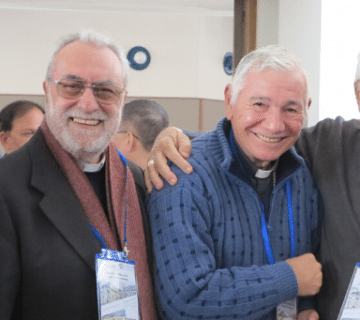A solemn Eucharistic concelebration to pray for the Pope’s complete recovery was said by 90 bishops coming from 47 different countries, gathered at Castelgandolfo for their annual meeting. The news of the Pope’s unexpected additional confinement reached them just before the conclusion of their meeting which began on February 19.
Before leaving for their respective dioceses, they sent the Pope a message of gratitude, assuring him of their prayers for his prompt recovery: “United with the whole Church, we ask for extraordinary graces for you.” The bishops expressed their deep gratitude to the Pope “for your luminous example of faith and love in facing this new trial and for your ministry which is wholly a gift!”
Indeed, the outstanding characteristic of those days was the exchange of messages with the Pope. An unexpected letter from the Pope, addressed to Cardinal Miloslav Vlk, arrived right before the Congress started. In reply, the bishops wrote: “Holy Father, truly you are the one who ‘loves most’ and ‘confirms his brothers’.”
 John Paul II in his message made special mention of Chiara Lubich, expressing his “gratitude for the evangelical witness which the Movement gives in many parts of the world.” With reference to the theme of the meeting he encouraged the bishops “to give witness in today’s society to the presence of the Risen Christ, the center of the Church” and “vital principle” which cannot but give rise to a “renewed apostolic vitality” and “missionary audacity” responsive to the challenges of our times. He therefore invited the participants to be “eloquent signs” of the love of the crucified and risen Lord, present in the Eucharist and “artifices of his peace everywhere.”
John Paul II in his message made special mention of Chiara Lubich, expressing his “gratitude for the evangelical witness which the Movement gives in many parts of the world.” With reference to the theme of the meeting he encouraged the bishops “to give witness in today’s society to the presence of the Risen Christ, the center of the Church” and “vital principle” which cannot but give rise to a “renewed apostolic vitality” and “missionary audacity” responsive to the challenges of our times. He therefore invited the participants to be “eloquent signs” of the love of the crucified and risen Lord, present in the Eucharist and “artifices of his peace everywhere.”
Chiara Lubich, in her message read by Natalia Dallapiccola, one of her first companions, underscored that “The Risen Jesus is not a static presence;” but he is a “‘unifying principle,’ and is therefore active: love.” She went on to say, “This, however, requires the response of the human being.” “Every division in the community … alters the profound identity of the Church… This is why, at times, the Church is not loved.” “It is reciprocity, communion, which renders the Lord ‘visible’.”
A number of bishops from different countries shared moving experiences of fruitful initiatives in the area of evangelization, of establishing peace between different ethnic groups and among politicians in nations suffering from conflict, such as Burundi, or in regions of Central America. There were also experiences of bishops, priests and lay people on “renewed apostolic vitality,” fruit of the presence of the Risen Jesus, in ecumenical and interreligious dialogue as well as in political and social fields.


 Italiano
Italiano Español
Español Français
Français Português
Português


